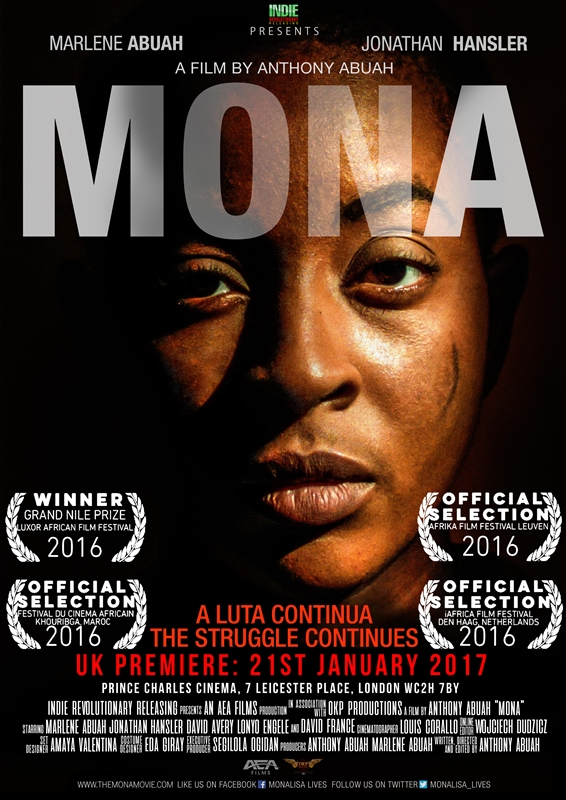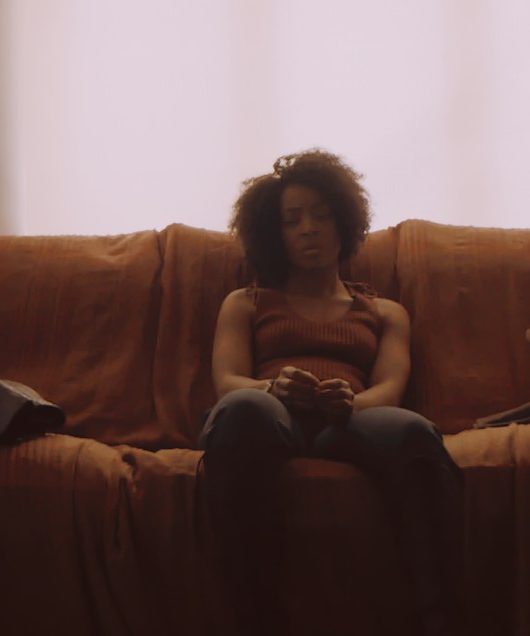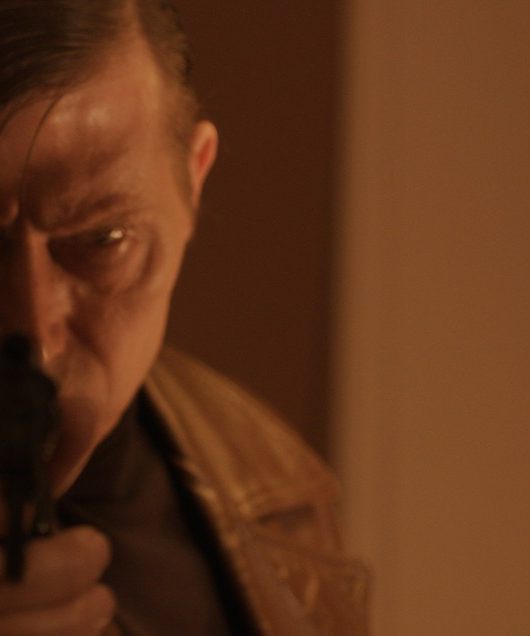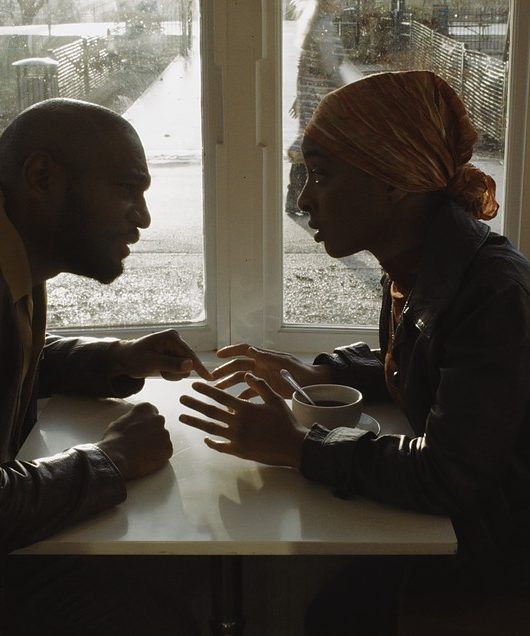A female assassin attempts to kill the Portuguese Prime Minister during a state visit to London in 1973! As far-fetched as it may sound, this story is the real-life plot for the critically acclaimed film, MONA, which premieres in the UK in January 2017.
Written and directed by Anthony Abuah, the film’s Executive Producer is 31-year old Segilola Ogidan, who, as well as being an actress/writer, is one of very few women of colour who runs her own production company, OKP Productions. We couldn’t pass up the opportunity to catch up with her to find out what it really means to be a filmmaker.

Melan Magazine: MONA obviously provides an intriguing subject for a film, but what was the deciding factor for you that made you want to get involved?
Segilola Ogidan: I really wanted the story told as I think it’s a fantastic way to educate people on that little bit of history, that I too initially, knew nothing about.
MM: You’re the film’s executive producer, what does that mean? What’s your role in the production?
SO: I invest in the project, help to secure funds, manage cast and crew and basically do anything and everything that the project requires at any time. From organising castings, to helping actors rehearse to cooking food for the team during the shoot, transporting people and equipment, creating investment proposals and pitching the film to potential investors, sponsors, buyers, sales agents, trying to get the film shown to the public, literally everything and anything! Oh and I also play a teeny tiny part right at the end of the movie.
MM: What qualifications or training do you need to become an exec producer?
SO: You will need some sort of degree or diploma in film but I would definitely also recommend having basic knowledge in film finance and sales because it really helps when you’re packaging the film and pitching to potential investors.
MM: When did you found OKP Productions, and what is it like running your own production company?
SO: I founded my company in 2012. It’s been a challenge to say the least but I’m determined to make it a success so I keep going!
MM: A female film maker who is also a woman of colour, I imagine that is rather a select and exclusive group. Are there any others?
SO: Gosh tell me about it! There’s a very small number of black female filmmakers in general in the UK and although that number is supposedly growing, I feel only a miniscule number actually manage to get anything made and seen for a number of reasons; usually limited financing. However, one major issue that I’ve identified on a number of occasions is the fact that they always seem to be in competition with one another, which is really sad. I’m a firm believer that together we’re stronger but they’re too focused on getting all the limelight to themselves so they don’t realise it keeps them in a stagnant position and I’m just not here for that. Hence why I work with the same people simply because there is no competition between us and we’re actually legitimately cheering each other on. I feel that’s the way it should be.
MM: What did you learn from the first film you produced, and wrote – Mum, Dad, Meet Sam?
SO: A LOT! However, I’ve learnt to trust my own instincts and abilities over others because quite frankly I have that passion that will make me work even harder and go the extra mile to make my film a resounding success.
MM: What was it like working with Anthony Abuah? Was he really hands on?
SO: YES! Very hands on! Which at first was a little jarring for me because I’m usually the one in charge, but he is so on it and I learned from him every day. Working with him during production was magical. I always used to dream and pray that I’d get the opportunity to work with a genius in my life time and I can truly say, that dream was realised when I worked with Anthony on MONA.
MM: In a nutshell how do you go about financing a film?
SO: There are so many routes one can take. If you have the money you can invest in the project yourself. Failing that, there are Angel Investors that you can approach (usually people you know), crowd funding is another good tool, public funding (BFI, Microwave, Creative England), EIS (Enterprise Investment Scheme) and if you have an excellent film that’s sure to make money, then you could try pre-sales (i.e selling your movie to buyers/distributors before you even get it made).
MM: How has the film been received so far?
SO: Really well! We’ve had a festival-filled 2016 that saw screenings in six countries around the world. The film won the Grand NILE Prize for best feature film at the prestigious Luxor African Film Festival, whose judges included Legendary African filmmakers such as Haile Gerima and Jihan El-Tahri. It has been praised as shedding light on Britain’s entry into the EU in 1973 and has been described as “an incredible cinematic achievement for one so young” (FCAK Morocco). It’s so good to have it released here in the UK too by Indie Revolutionary!
MM: What’s your take on the Nollywood film industry?
SO: It’s going back to the quality we saw in the golden era of years gone by (some exceeding that) which is really exciting! It’s also being taken seriously by the International film market and audiences which makes my profession that bit more credible.
MM: Do you identify with it?
SO: To some extent yes. I was born and raised in Nigeria and I definitely identify with some of the subject matters and issues raised in the films. Furthermore, the way that the actors express themselves is very realistic ,albeit dramatic at times, and the way some of the stories are told have that mythical feel that reminds me of when my Granny used to tell us stories as kids. They provide great escapism (the ones that tell authentic Nigerian stories that is).
MM: What’s your heritage?
SO: Nigerian. Ondo State, Arigidi Akoko (try pronouncing that! Lol).
MM: How do you juggle career and family?
SO: I am married and have a young son and so juggling everything is definitely challenging. I start my year making one huge goal and I basically spend my year trying to achieve that goal by making daily lists and ticking them off. That way I don’t feel overwhelmed and have a clear idea of what needs to be done. Having said that, if my family and work overlaps, I always choose my family first and do the work later. They’re what’s most important to me and they’re my priority.
MM: What would you say are the main challenges in the work that you do?
SO: Definitely raising finance for the projects! I can’t wait for the day when someone approaches me and says ‘Segi here’s a million pounds, go make a film’!! Seriously, it can be a nightmare!
MM: So, what can viewers expect to take away from the film?
SO: The experience of having watched a great film and the knowledge that there’s some fantastic talent in the UK film Industry.
MM: What’s next for Segilola?
SO: I’ve written the sequel to Mum, Dad, Meet Sam so I’m hoping to team up with some of the old crew to get it made.
Look out for a red carpet premiere of MONA on: Saturday 21 January 2017, Prince Charles Cinema, Leicester Square.
View a trailer of the film.















